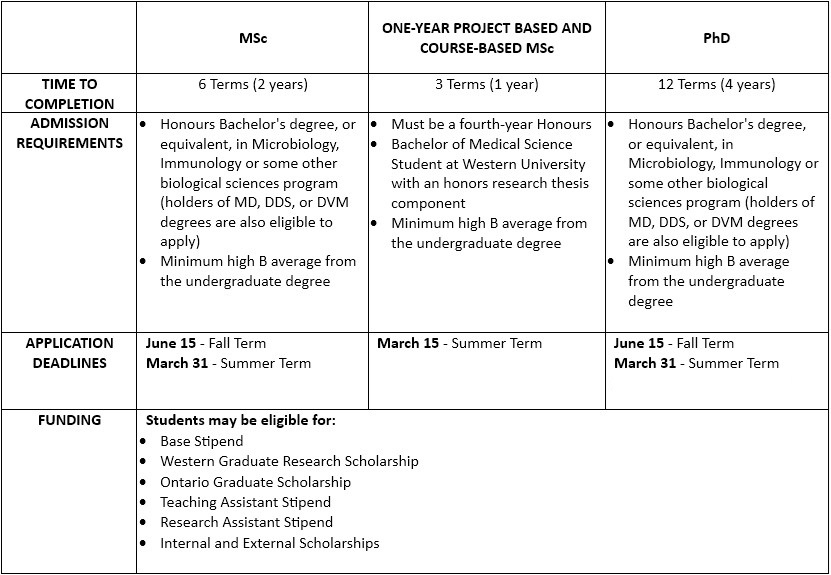Collaborative Specialization is an intra-university graduate field of study that provides an additional multidisciplinary experience for students enrolled in and completing the degree requirements for one of a number of approved Master’s and/or PhD programs. The Microbiology and Immunology Graduate program participates in multiple Collaborative Programs.
Developmental Biology
The purpose of the collaborative program in Developmental Biology is to create a community of graduate students with an interest in Developmental Biology and to provide specific courses to support and teach that community.
DEV 9000 (Developmental Biology) is a required two-term course for all MSc students enrolled in the Developmental Biology program. This is in addition to the courses required for MSc and PhD programs in the Department of Microbiology & Immunology but will replace the requirement for writing and defending a grant proposal in MICROIMM 9000A. DEV 9100 is a half course to be taken in the second year for PhD students. Schedule conflicts with Microbiology & Immunology courses will be assessed on an ad hoc basis by the Graduate Studies Committee.
Molecular Imaging
This program is designed for students that are interested in the disciplines of Molecular Imaging as well as Microbiology and Immunology. The combination of solid disciplinary training provides students with the tools necessary to better understand and conduct research in the area of Molecular Imaging.
Required courses/substitute courses:
Medical Biophysics 9518B (Molecular Imaging) is a required one-term course for all students in the Molecular Imaging program. This is in addition to the courses required for MSc and PhD programs in the Department of Microbiology and Immunology. Schedule conflicts with Microbiology and Immunology courses will be assessed on an ad hoc basis by the Graduate Studies Committee. Students are required to attend a monthly Molecular Imaging journal club as a substitute for the M&I journal club.
Global Health
This Collaborative Specialization will augment the training received in the student’s home department by providing specialized training in scholarship related to Global Health Systems in Africa. The objective is to provide students with a transdisciplinary, knowledge-to-action, systems approach learning experience (in both research-based and professional programs) in order to become global leaders with an understanding of one of the most challenging, complex areas of the world. Students will explore thematic areas inspired by the 2015-2030 United Nations (UN) Sustainable Development Goals where Western University has established strengths such as in poverty reduction; maternal and newborn child health; HIV/AIDS and other infectious diseases; environment and sustainability; and food and nutrition.
Musculoskeletal Health Research
The Collaborative Specialization in Musculoskeletal Health Research will develop scientists with the research and leadership skills necessary to build transdisciplinary research teams focusing on integrated therapeutic, surgical and rehabilitative approaches for the management of bone and joint diseases.
Specifically, the program's purpose is to:
Enhance the number of trainees involved in transdisciplinary musculoskeletal health research
Support the career advancement of trainees Foster the development of future leaders in Canadian health care, science and technology
Double PhD program between Sichuan University, West China School of Medicine and the Schulich School of Medicine & Dentistry, Western University.
Sichuan University and Western University entered into a memorandum of understanding in 2009 relating to clinical education, faculty exchanges, and research between the West China School of Medicine and the Schulich School of Medicine & Dentistry. They established a program whereby eligible students have the opportunity to pursue coordinated doctoral studies at both institutions and obtain a doctoral title from each institution. The admission to each doctoral program is by two separate and independent selection processes, in accordance with the respective regulations of each institution. The expected duration of this program is four years with research and activities carried out at the two institutions during alternated periods.
To participate in this program, students must be accepted to the graduate program in Microbiology & Immunology at Western University as well as by an appropriate graduate program at Sichuan University.











